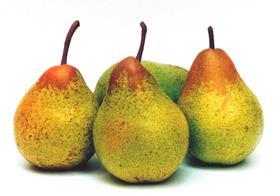
While the European apple crop is predicted to be 14 per cent larger this season due to a recovery in production across eastern Europe, the continent's pear volumes are expected to decrease by 14 per cent to 2.16m tonnes this year – the smallest crop for more than a decade – on the back of smaller forecast crops in the leading western European supplier countries.
According to Frederic Rosseneu of the World Apple and Pear Association (WAPA), the downturn is mainly the result of frosts and cool weather during the spring. As with the apple crop, harvesting across western Europe will tend to be delayed by around 7-10 days this season.
Although production is expected to recover in the EU's new member states, the dominance of western European countries when it comes to pear production – far greater than for apples – means that a 71 per cent annual increase in production across eastern Europe will not be enough to keep overall EU production at a level similar to that seen last year.
According to figures published by the WAPA at this year's Prognosfruit conference, held in Ashford, UK, Italian pear production is set to fall to 755,000 tonnes, 18 per cent lower than last season's 922,000 tonnes and 18 per cent down on the average figure for 2005-2007.
In France, meanwhile, pear output is forecast to reach 157,000 tonnes, 29 per cent lower than the 2007 total and the smallest crop seen in the past decade.
Belgium's crop is also set to fall, down 38 per cent to 177,000 tonnes according to the forecast, while in the Netherlands pear producers anticipate a 33 per cent drop in volumes to around 170,000 tonnes. Germany is forecasting a 19 per cent fall in production to 46,000 tonnes.
As with apples, Spain is the only major western European producer likely to show an increase in pear output, with its forecast suggesting a 3 per cent rise to 508,000 tonnes.
Portugal's Rocha pear crop is forecast to come in at 173,000 tonnes, 28 per cent higher than in 2007.
With around three-quarters of EU pear exports heading for Russia, the prospect of a smaller crop and a European market where supply and demand are already well balanced is likely to mean prices will be strong at the start of the campaign, according to Helwig Schwartau of market analyst ZMP.
'Those who grow pears will have a very good year indeed,' he commented. 'This is the smallest EU pear crop in the last few years and with a deficit of around 35,000 tonnes the remaining Southern Hemisphere production won't be able to compensate for this.'



